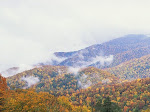Why do the
problems we face, from economic meltdowns to ecological destruction seem so
intractable? Why do so many of measures taken to solve problems seem to be
ineffective or even counterproductive? What might work better? Let’s look
through a different lens; Ecosystems, from forests to prairies to coral reefs,
are not simply beautiful, they are first and foremost economic systems –
systems that represent the most
successful, enduring economies on earth.
A pound of forest soil contains thousands of
bacterial species but also fungi, worms, beetles – gainfully employed,
competitive, yet mutually contributing to the forest’s
overall health. Ecosystems have no credit card debt, no inflation, and no
federal deficits. Nothing is too big to fail and there are no government
bailouts. Despite numerous cataclysms – ice ages and asteroid collisions life
has evolved, adapted and thrived for 3.8 billion years.
Yet, rather
than learning from nature we are assailing it with ferocity; the dominant
economies are depleting fisheries, destroying forests, creating dead zones in
coastal waters and uprooting traditional societies whose economies are closely
aligned with nature. We are changing climate in ways that will create future
displacements and economic havoc.
The
presentation examines the elements of resilience and health in ecosystems and
contrasts them with increasing systemic vulnerability found in the dominant
human economies.
What we need
is a restructuring of human economies
in ways that capitalize on: (a) the resilient and resource efficient organizational
arrangements found in nature and (b) mutually beneficial partnerships with
natural systems.
The presentation draws on several positive
examples – some by MOFFA entrepreneurs. So large a transformation from today’s
economics to the economics of resilient health cannot happen overnight; however
it is essential that we point our compasses for the right direction.









Interesting and valuable ideas! Made me think of the following points:
ReplyDelete* Waste is an important aspect of our economies that we should address. Nature knows no waste. Perhaps our economies too should charge for disposal of stuff and incorporate this cost into the price of products we buy. It seems to me that alone, if can be done, will change a lot of things.
* Does that mean we are making an argument against social systems, when we say our economies should be like nature? Will it be survival of the fittest? Nature can be brutal, it has no values (or as we think of them), how should we incorporate values, which all humans have, into our ecnomies? What should we and what shouldn't we learn from nature?
Thanks for your comments, Anonymous. I agree with your first point. I intend to address the second point at length in a forthcoming book on this subject. We must strengthen social systems so that they are far more resilient. Remember that brutality in ecosystems (e.g. a hawk swooping down and devouring a baby bird or a pack of wolves felling a straggling caribou) may seem brutal, but compared to the brutality of human warfare, nature seems rather benign.
ReplyDeleteRight now we have an economic system which increasingly resembles "survival of the richest." It is a brutal system that marginalizes growing numbers of poor. Look at the flow of capital -- you have a loan with a big bank, they charge you 18 percent, you put your savings in the same bank, if you're lucky you get 2 percent. Nature by in large is a thriving complex and resilient system involving a great deal of competition and cooperation; there are no give aways to the most powerful. The hawks and wolves work their tails off and of the whole food web have the smallest amount of biomass.
Now on to the philosophical question which includes two dimensions. First, moral...Many or most cultures believe in protecting the most vulnerable people. That's not the same as protecting vulnerable businesses. We should have a social safety net; its an important part of the infrastructure. If the safety net is missing the society winds up paying -- i.e. investing in prisons rather than education, investing in expensive cleanup operations instead of clean technology, etc.
I thank you again for your critically important questions and invite further dialog.
Hank Cole
P.S. there are many social systems in nature; pods of dolphins and whales, a bee hive, an ant colony, canine packs, primate groups, herds of caribou. All of these systems feature a great deal of cooperation as well as competition between members. Somebodies got to be alpha dog.
ReplyDelete